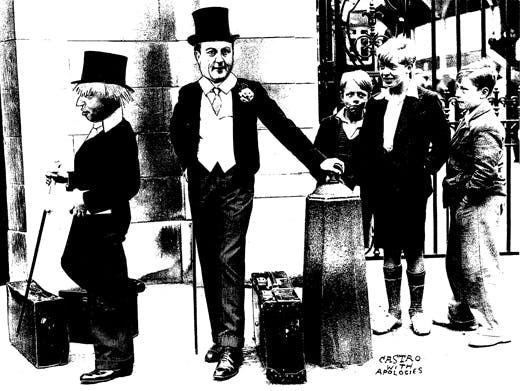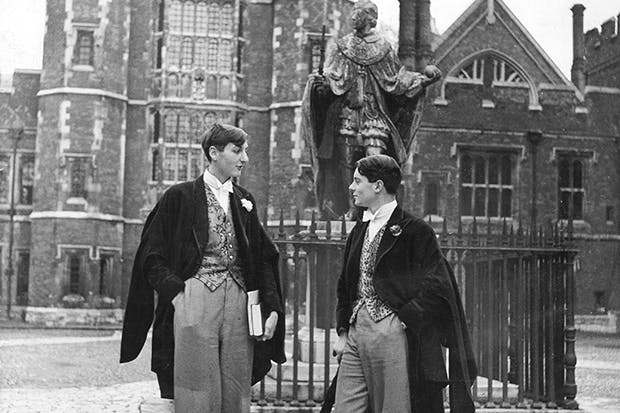One of the first things you realise on arriving at Eton is that while you may be at arguably the best school in the world, you’re also possibly among Britain’s most hated. It’s great being surrounded by 15th-century quadrangles and Georgian boarding houses, and your uniform is as dapper as it gets (so long as you don’t mind dressing like a penguin). But you can’t walk into Windsor wearing a college crest, for fear of being mugged, and the papers are filled with stories claiming you’re overprivileged or not actually that clever. It’s a double-edged sword. You have the advantage of a brilliant education, but bear a stigma that can’t be removed no matter how many times you pretend to your friends that you vote Labour.
This makes you wonder — if the outside world hates us so much, how come Old Etonians do so well? The Prime Minister, the Archbishop of Canterbury and the Mayor of London are all OEs. And if Zac Goldsmith is selected as the Conservative mayoral candidate in London, the anachronism isn’t going to end any time soon. Not so long ago, the consensus was that the golden age of Old Etonians had ended with Harold Macmillan and Alec Douglas-Home. Why, then, do people still vote for them?
It might be to do with the fabled quality of Etonian charm — or as it’s sometimes called, the ability to ‘oil’. And no, it’s not on the curriculum. But to succeed at Eton you do have to use a certain amount of persuasiveness, whether it’s arguing your case to the headmaster when you’ve done something wrong and you’ve been put on ‘The Bill’ (report), convincing your ‘beak’ (teacher) not to give you a long ‘EW’ (piece of homework), or talking people into coming to your house play when they might have something better to do.
Right from the start, you’re encouraged to think and act as though you’re already a grown-up. You look around and see how influential older pupils are in the running of the school. Distinct in patterned waistcoats, Pop, the school’s elite cadre of prefects, are able to distribute ‘tardy book’ (a punishment where you have to get up early to go to the school office) as they see fit. In neatly furnished offices, The Chronicle, the school magazine, runs a profitable business. Nearly every night, a plethora of speakers, the leaders in their field, come and speak to boys about their specialist subjects. Sometimes, Eton seems more like a mini-university than a school, which means, you could argue, that you’ve already got a five-year head start on your rivals when you arrive at university proper.
On your first few days as an ‘F Blocker’ (first year), the school can be pretty daunting. The ties are a killer, getting lost is a certainty and, as you can see, there’s a special language you’ve got to learn. But after a week, Eton seems completely natural. From then on, you’ve finished your grace period; it’s up to you to survive. You do your work unsupervised and when you want — pupils aren’t crammed into prep rooms. It’s from being trusted with this early independence that Etonians become so fit to cope in the outside world. They have to find their way without any help from others, or else make the effort to acquire someone’s help.

Although some current Etonians would argue that going to school in such a sheltered environment means the outside world can seem like a bit of a jungle, it’s not that clear-cut. Through subtle things, such as changing your own sheets, having your own room, even deciding when you go to bed, Etonians are shown that they are no longer children and any mess they make is theirs to fix.
This is not to say that Etonians are tossed like Spartan babies to fend for themselves. With the support of your tutor, your housemaster and your ‘dame’ (a kind of matron whom you address as ‘ma’am’, which rhymes with ham), you gradually develop correct etiquette — what to write on a thank-you letter, how to shine in a university interview and, most significantly, how to socialise.
People often say Etonians are recognisable because of the confidence they exude. I suppose it comes from ease in conversation. From what I’ve seen, Etonians are brilliant at buttering people up. There are lots of opportunities to practise it. Whether it be dinner in your housemaster’s private dining room, taking a visiting speaker out, or cooking supper at your tutor’s, you’re often participating in intelligent conversation with grown-ups.
Of course, there is a minority for whom this confidence turns into arrogance, but it is a minority. You’d think that a school whose alumni include everyone from Shelley and the Duke of Wellington to George Orwell and Prince Harry would be obscenely snobby, but the opposite is true. Etonians quickly learn to tone down their snobbery, if only because playing it up is considered a bit ‘oiky’. Arrogance is stamped on. It’s hard, anyway, to get too big for your boots in a school where no matter how great you think you are, there’s always going to be someone smarter, richer or with more acres than you.
The result of this is a competitive meritocracy, at least within Eton’s walls, where no one cares much what your father does for a living. Lots of boys come from backgrounds where they need bursaries to help with the fees, but you’re very much judged on your achievements. That’s why in ‘Trials’ (school exams) you’re told exactly where you’ve come in your year in each subject (e.g. 135th out of 252). This makes it hard not to be competitive, even if you think you’re not.
My dad tells me a thing he’s noticed about my school friends and me is that we all have a ‘studied diffidence’, which he accuses me of cultivating. I’ve no idea if this is true and it’s not something I’ve ever thought about. When you’re an antelope, being an antelope is the only thing you know.
So maybe a schoolboy who’s still at Eton is the wrong person to ask. But if I had to guess why Etonians do so well, it’s because the whole school is a sort of dress rehearsal for real life — or the sort of life Etonians can expect to lead. When you find yourself on ‘The Bill’, trying to justify your actions to the headmaster in the oldest schoolroom in the country, it’s eerily similar to arguing in court. When you’re rallying round your house captain at a crucial house football match, or chanting in unison with your housemates, hitting bins in noisy support, it’s like MPs waving their order papers in support of their party leader. Some new MPs might gawp at the impressive architecture of the House of Commons, but if you’re an OE it feels completely normal. We go from one quadrangle to the next, without pausing to notice that such environments are alien to most people.
Recently, I found myself watching the scene in the 1981 TV version of Brideshead Revisited where Lord Sebastian Flyte tries to charm his way out of being arrested for drink-driving, and I realised just how little has changed. People want to hate us, but in the end they can’t resist us. It’s like Dermot O’Leary said the other day: ‘We trust an Old Etonian in this country. We just do — even if we don’t know we’re doing it. It’s bred into us that they can run the country.’
SCHOOLED TO RULE
It’s not just the Prime Minister, the Mayor of London and our future king. Old Etonians are still at the heart of British public life

BEAR GRYLLS
Chief Scout, the presenter of numerous television series, and President Obama’s personal survival coach

EDDIE REDMAYNE
The latest British actor to conquer Hollywood, winning an Oscar for his performance in The Theory of Everything

ZAC GOLDSMITH
Conservative MP for Richmond Park, and likely Tory candidate in the 2016 London mayoral election

JUSTIN WELBY
Former businessman in the oil industry and the third Old Etonian to become Archbishop of Canterbury







Comments